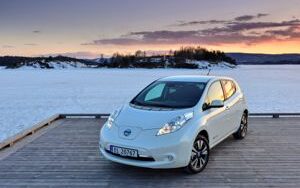Motorists will be able to sell unused energy from their Electric Vehicle’s lithium-ion batteries back to the grid in an exclusive deal between vehicle OEM Nissan and Spanish electric utility company Endesa.
Nissan signed the agreement to bring to market Endesa’s, an Enel Group subsidiary, vehicle-to-grid (V2G) system during the 85th Geneva International Motor Show.
In the short term Nissan’s Leaf and e-NV200 will be the only vehicles able to re-sell energy from their 360V lithium-ion batteries.
The V2G technology allows users to charge EVs at low-demand, cheap tariff periods, and either use the electricity stored in the vehicle’s battery in their home when costs are higher, or feed it back to the grid with a net financial benefit.
The production of the two-way chargers is planned for next month, however the launch of commercial V2G services to the mass market depends on the national regulations and the possibility for individual households to supply electricity to the grid.
The V2G system consists of the Endesa two-way charger and an energy management system.
The company first showcased its V2G technology in 2008 in Malaga, the Enel Group testing ground for smart cities.
Nissan plan for the first real early adopters to appear in Europe next May, with the mass market commercial solutions potentially ready by the end of 2015.
Endesa, as part of a Green eMotion initiative in Spain, has fitted a battery from a Renault EV into a fast-charging point in Malaga, Spain. The 50kW battery can charge 80% of a vehicle’s battery in 15 minutes.
Endesa is also working on its VICTORIA project to develop an electric bus lane in Malaga – a so called ‘smart city’ – to power a bus by dynamic induction.












